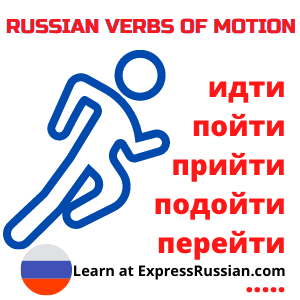In this article:
Russian Verbs of Motion ходить / идти / пойти / прийти
Did you ever wonder what is the difference between such Russian verbs as ходить / идти / пойти / прийти ?
Well, first of all, all these verbs describe movement, therefore, they are called Russian Verbs of Motion (глаголы движения).

However, in Russian, there are tenses, aspects, and conjugations, which is why you have all these different forms.
Check the comprehensive explanation and conjugation tables to help you use the correct form!
Difference between Russian verbs of motion ИДТИ and ПОЙТИ
ИДТИ and its analog ПОЙТИ are Russian concrete verbs. The prefix ПО- means “the start of movement”, otherwise the meaning is the same – “to go, to move, to walk one-way, to set off”, they are interchangeable in most cases.
Full list of prefixes used with verbs of motion
Idioms and stable expressions with ИДТИ
- идти пешком – go on foot (walk)
- идти домой – go home
- поезд идёт до станции Москва – the train circulates (goes) to the Moscow station
- идёт лавина – there is (comes) an avalanche
- медленно идут облака – the clouds pass slowly
- идти гулять – go walk (go for a walk)
- идти в бой – go into battle
Conjugations of ИДТИ / ПОЙТИ
present tense
1st singular (я) иду́
2nd singular (ты) идёшь
3rd singular (он/она́/оно́) идёт
1st plural (мы) идём
2nd plural (вы) идёте
3rd plural (они́) иду́т
future tense
1st singular (я) бу́ду идти́ / пойду́
2nd singular (ты) бу́дешь идти́ / пойдёшь
3rd singular (он/она́/оно́) бу́дет идти́ / пойдёт
1st plural (мы) бу́дем идти́ / пойдём
2nd plural (вы) бу́дете идти́ / пойдёте
3rd plural (они́) бу́дут идти́ / пойду́т
imperative
singular иди́ / пойди́
plural иди́те / пойди́те
past tense
singular
masculine (я/ты/он) шёл / пошёл
feminine (я/ты/она́) шла́ / пошла́
neuter (оно́) шло́ / пошло́
plural
(мы/вы/они́) шли́ / пошли́
In contrast, their counterpart ХОДИТЬ is an abstract verb.
Difference between Russian verbs of motion ИДТИ and ХОДИТЬ
ХОДИТЬ means same as ИДТИ but it is used to denote a movement done not at the same time, not at one go or not in one direction. It would be best translated into English as “to wander”, “to ramble”.
Idioms and stable expressions with ХОДИТЬ
- ходить вокруг да около – to beat about the bush (= not telling something directly)
- ходить по краю пропасти – walk on the edge, walk on the thin ice
- ходить туда-сюда – go back and forth
- ходить пешком – to walk
Conjugations of ХОДИТЬ
present tense
1st singular (я) хожу́
2nd singular (ты) хо́дишь
3rd singular (он/она́/оно́) хо́дит
1st plural (мы) хо́дим
2nd plural (вы) хо́дите
3rd plural (они́) хо́дят
future tense
1st singular (я) бу́ду ходи́ть / (interchangeable in meaning with пойду́)
2nd singular (ты) бу́дешь ходи́ть / (interchangeable in meaning with пойдёшь)
3rd singular (он/она́/оно́) бу́дет ходи́ть / (interchangeable in meaning with пойдёт)
1st plural (мы) бу́дем ходи́ть / (interchangeable in meaning with пойдём)
2nd plural (вы) бу́дете ходи́ть / (interchangeable in meaning with пойдёте)
3rd plural (они́) бу́дут ходи́ть / (interchangeable in meaning with пойду́т)
imperative
singular ходи́
plural ходи́те
past tense
singular
masculine (я/ты/он) ходи́л
feminine (я/ты/она́) ходи́ла
neuter (оно́) ходи́ло
plural
(мы/вы/они́) ходи́ли
Most noteworthy, Russian verbs ИДТИ, ПОЙТИ, ХОДИТЬ belong to the imperfective aspect which presents an event without exact finish implication (such as ongoing or habitual actions).
ПРИЙТИ , however, is a Russian verb of motion belonging to the perfective aspect. Perfective aspect is used for momentary events and the onsets or completions of events. That is why, it would be best translated into English as “to come”, “to arrive”.
Conjugations of ПРИЙТИ
present tense (TIP: even if the verb is used in present form, it would mean “near future or anticipated” action, as Russian prefix ПРИ- denotes “done deal”)
1st singular (я) прихожу́
2nd singular (ты) прихо́дишь
3rd singular (он/она́/оно́) прихо́дит
1st plural (мы) прихо́дим
2nd plural (вы) прихо́дите
3rd plural (они́) прихо́дят
future tense
1st singular (я) приду́
2nd singular (ты) придёшь
3rd singular (он/она́/оно́) придёт
1st plural (мы) придём
2nd plural (вы) придёте
3rd plural (они́) приду́т
imperative
singular приди́ / приходи́
plural приди́те / приходи́те
past tense
singular
masculine (я/ты/он) пришёл
feminine (я/ты/она́) пришла́
neuter (оно́) шло́ / пришло́
plural
(мы/вы/они́) шли́ / пришли́
Idioms and stable expressions with ПРИЙТИ
прийти вовремя – come on time
прийти в себя (в чувство) – come to senses
прийти в сознание – regain consciousness
прийти к соглашению – come to an agreement
прийти на помощь – come to rescue
Usage examples of Russian verbs of motion
What would be the right word to use ? Read and compare!
Я ходил в школу 10 лет. – I have been going to school for 10 years.
Вчера я шел по улице и увидел Елену. – Yesterday I was walking along the street and saw Elena.
Мой сын сегодня пошел в школу. – My son went to school today.
Вы пойдете завтра гулять? – Will you go for a walk tomorrow?
Они будут идти домой пешком. – They will be going home on foot.
Пойдем в кафе. – Let’s go to the сafe.
Ходить пешком полезно. – Walking (aka going on foot) is good for health.
Когда я пришел, они уже ушли. – When I arrived, they had already left.
RELATED POSTS:
PREFIXES IN RUSSIAN VERBS OF MOTION
RUSSIAN GRAMMAR & PHRASEBOOK FOR BEGINNERS
RUSSIAN FOR BEGINNERS – SELF-PACED ON-DEMAND VIDEO COURSE

Hungry for more?
Find this and many other questions about the use of the Russian language answered here!
Do you have questions? Please leave them in the comment box and let’s discuss!


10 replies on “Russian Verbs of Motion Ходить/Идти/Прийти”
Best explanation I have come across so far! Thank you for this post!
Verbs идти and ехать are called unidirectional. Verbs ходить and ездить are called multidirectional. With adverbs telling how often trips are made (часто – often, редко – rarely, обычно – usually, каждый день – every day, etc.) the multidirectional verbs ( ходить, ездить ) are used.
A Russian pen pal directed me to your site, particularly to your site about the verbs to go, i.e. a verb of motion. I understand everything there as to the differences among the three forms. However, please explain and give examples showing the differences in the imperative forms. You give examples of everything but the imperative forms. What is the difference between иди! и поиди! …between иди в школу! и пойди в школу! I consider my Russian pretty good, but for ten years I have been asking this question and have never gotten an answer. Some say it is the same. There is no “the same” in any language! The same problem for me is true for all verbs of.motion … лезь! полезь! лети! полети! etc. I understand the indicative usages but not the imperative usages. Thank you.
Hello Burton, thanks for this interesting question! The issue you are addressing, though, has nothing to do with indicative / imperative form (иди и поиди are both used in imperative form). The difference between иди и поиди lies in the usage of prefixes in Russian verbs. As it was mentioned in this post, prefix ПО- means “the start of movement”, otherwise the meaning is the same – “to go, to move, to walk one-way, to set off”, they are interchangeable in most cases. In this case, prefix ПО gives a slight change of meaning and it also changes the aspect – from imperfective (иди) to perfective aspect (пойди). See these examples: Вчера я шел по улице и увидел Елену. – Yesterday I was walking along the street and saw Elena. Иван ПОшел в магазин. – Ivan went to the shop (meaning, he left the house, set off, just left to do the shopping).
I encourage you to read the recent post about usage of prefixes in Russian verbs of motion.
Thanks a lot. It’s so hard for me to find helpful Russian learning materials on Chinese websites. Your website really is a great one.
I am happy you find my website useful! Happy e-learning )
[…] Russian Verbs of Motion […]
[…] more example with Russian verb of motion Идти in the Past […]
[…] the help of prefixes, unidirectional Russian verbs of motion regularly form verbs in perfective aspect denoting “start of action” (побежать = to run, […]
[…] Russian Verbs of Motion Ходить/Идти/Прийти […]